Donald Trump’s steel tariffs: What it means for Australia
Anthony Albanese is under pressure to protect Australia from a 25 per cent tax on all steel and aluminium imports being proposed by US President Donald Trump. See what it means.
Companies
Don't miss out on the headlines from Companies. Followed categories will be added to My News.
Anthony Albanese is under pressure to use his phone call with Donald Trump to secure Australia an exemption from the US President’s proposed tariffs on steel and aluminium that jeopardise more than half a billion dollars in exports and thousands of jobs.
Industry groups and the Coalition have called on the Prime Minister, who is expected to hold a pre-scheduled discussion with Mr Trump on Tuesday, to protect Australia from a 25 per cent tax on all steel and aluminium imports due to be announced imminently.
More than $15bn was wiped from Australian markets on Monday morning as Mr Trump confirmed in the US he planned to announce the new tariffs within days.
Coalition trade spokesman Kevin Hogan said resolving this renewed threat to Australia’s $550 million worth of exports to the US was a “big job” for the PM and his “hand-picked” Ambassador Kevin Rudd, given both have a history of disparaging comments about Mr Trump.
“It is time critical the Labor government ensures an exemption for Australia,” he said.
“Prime Minister Albanese and Ambassador Rudd have a big job on this issue. I hope they are up to it.”
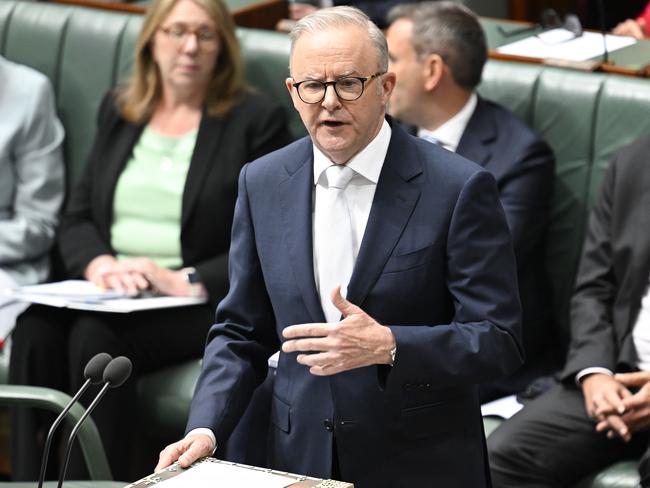
Australia previously avoided similar tariffs introduced by Mr Trump in 2018, which at the time modelling by Deloitte Access Economics found could cost 20,000 jobs and $5bn in national income.
Mr Albanese on Monday confirmed his upcoming “discussion” with Mr Trump, vowing to keep Australians “informed” of the outcome of what would be his second conversation with the US President since he won re-election.
“We will continue to make the case to the United States for Australia to be given an exemption to any steel and aluminium tariffs,” Mr Albanese said.
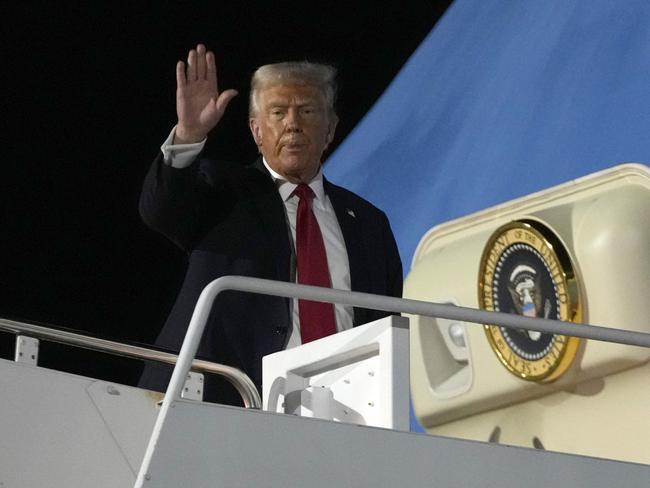
The PM said trade issues had already been raised with the US administration in recent ministerial discussions, with both Foreign Minister Penny Wong and Defence Minister Richard Marles holding talks with their counterparts this year.
A spokesman for Australia’s biggest steelmaker BlueScope, which directly employs about 3000 people at its Port Kembla operations in the NSW Illawarra, said the company would “await further details” before commenting on the tariffs.
BlueScope has also long invested in the US and now also employs some 4,000 American workers locally.
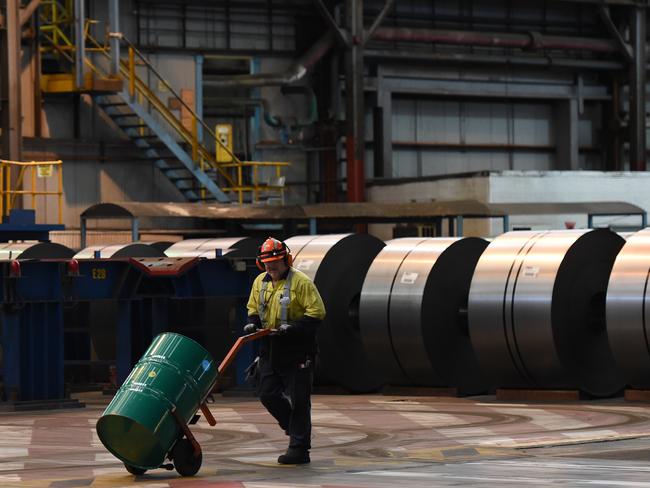
Australian Industry Group chief executive Innes Willox said businesses had been working with the Department of Foreign Affairs and Trade to ensure there were no tariffs for aluminium, steel and iron produced in Australia.
“It is now up to the federal government to quickly step in and protect Australian industry and producers from being caught up in a rapidly escalating global trade war,” he said.
“Reversing these tariffs must be a national priority, and the government must use all the leverage at its disposal to quickly turn this around.”
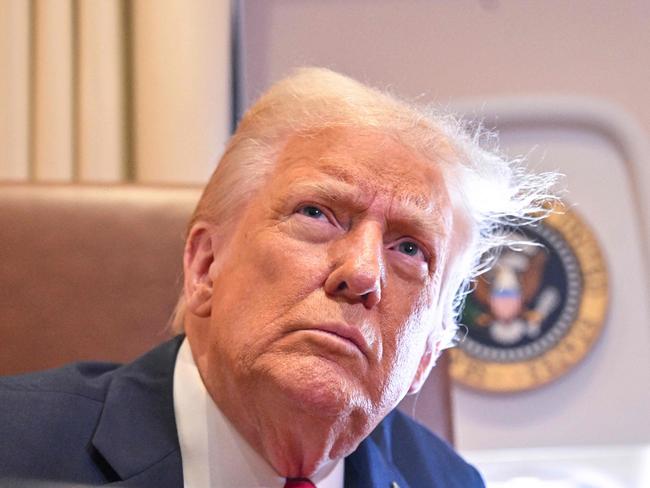
Business Council of Australia chief Bran Black said Mr Albanese’s scheduled call with Mr Trump was “strongly welcomed” as no country could afford to be complacent on tariffs.
“There is still a lot of uncertainty around how these tariffs may be applied and the government should continue doing everything possible to get the best outcome for Australia,” he said.
Trade Minister Don Farrell, who has declared there was “no reason” for the US to impose tariffs on Australian goods, said the government had “consistently” made the case for free and fair trade.
“Our bilateral economic relationship is mutually beneficial – Australian steel and aluminium is creating thousands of good paying American jobs, and are key for our shared defence interests too,” he said.
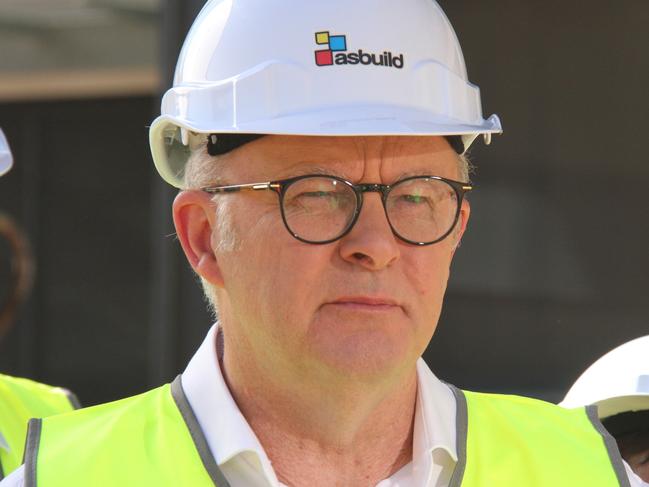
NSW Premier Chris Minns said it was “very difficult” when other countries put up trade barriers, because it meant Australia was placed at a disadvantage.
“These trade wars are a real risk to the NSW and Australian economy,” he said.
Mr Minns said he was concerned both about the dumping of Chinese aluminium, steel and manufactured goods onto the Australian market, and the direct risk to Australian producers posed by any trade barriers to the US.
Mr Albanese said Australian companies had “significant investments” in the US steel industry, which supported thousands of jobs in both countries.
The PM said Australia’s Ambassador to the US Kevin Rudd had met with Mr Trump before the steel and aluminium tariff announcement.
“We will continue to engage diplomatically with the United States, not with loud wailers, but diplomatically,“ he said.
Mr Albanese also confirmed he had a meeting with Rio Tinto’s global chief executive on Monday morning Australian time about the tariff issue.
TRUMP TARIFFS EXPLAINED
WHAT DOES TARIFF MEAN?
A tariff is a tax placed on imports and it means Australian steel and aluminium exports to the US will become more expensive for buyers and so likely reduce demand for them.
Steep tariffs can effectively cripple exports and if the duties are imposed, Australian industry will be heavily impacted.
HOW HAS THE STEEL SECTOR REACTED?
Australia’s biggest steelmaker, BlueScope, released a statement on Monday morning shortly after President Trump’s announcement.
The company - whose Port Kembla operations in the Illawarra directly employ about 3000 people and support another 10,000 jobs including contractors and suppliers - said they were awaiting further details on the President’s announcement, and pointed to their sizeable footprint in the US.
“We are aware of media reports this morning that President Trump has said he will announce tariffs on steel and aluminium imported to the US,” a BlueScope spokesman said.
“BlueScope has been investing in the United States for 30 years. Most recently, we have spent $2 billion on acquisitions and brownfields expansion of our operations there. BlueScope is now the fifth largest steel producer in the US, employing 4000 American workers.
“BlueScope abides by all trade rules and agreements. We will continue to work with the Trump administration and the Australian Government, as we await further details. We have no further comment to make at this stage.”
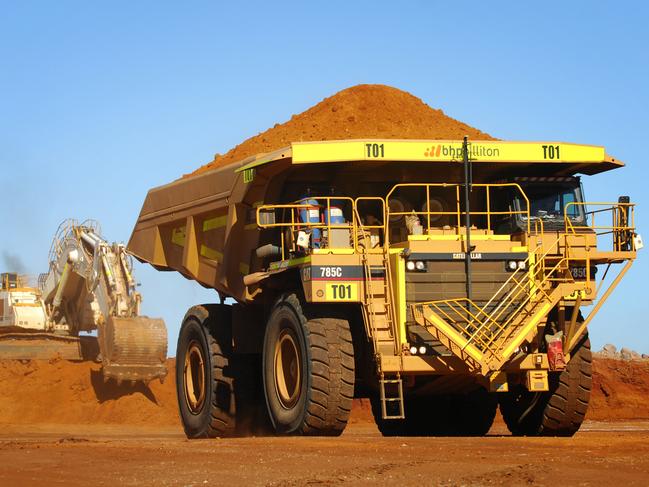
WHAT HAS AUSTRALIA’S TRADE MINISTER GOT TO SAY?
Trade Minister Don Farrell said the government had “consistently” made the case for free and fair trade, including access into the US market for Australian steel and aluminium.
“Our bilateral economic relationship is mutually beneficial - Australian steel and aluminium is creating thousands of good paying American jobs, and are key for our shared defence interests too,” he said.
Mr Farrell also noted Labor had “shown how effective we are in dealing with our major international partners,” a likely reference to the government’s talks with China leading to Beijing lifting tariffs and trade blocks on a range of Australian goods.
WHAT DOES IT MEAN FOR AUSSIE-US RELATIONS?
Nationals leader David Littleproud took aim at Australia’s Ambassador to the US Kevin Rudd, as he urged dialogue on the matter “urgently”.
“We were able to send Joe Hockey there to be able to put a cogent argument about carving Australia out,” he told Sky News.
“And unfortunately, we’ve got an ambassador there that’s made disparaging comments about the President.
“And we’ve got a Prime Minister that’s made disparaging comments about the President.
“So it’s important that dialogue’s opened up urgently, if they’ve even given that opportunity, and that we’re carved out.
“This is a moment where the Albanese government will be held to account about their ability to deal with the new president.”
HOW IMPORTANT IS AUSTRALIA’S ALUMINIUM SECTOR?
Aluminium is Australia’s fourth largest raw material export, with the majority going to South Korea and Japan. The United States is the third-largest export market for Australian aluminium. In the previous Trump administration, Australian steel and aluminium were exempt from tariffs.
In 2024, Australian aluminium exports totalled $5.2bn and directly employed over 17,000 people.
On January 20, Anthony Albanese announced an additional $2bn in support for the Australian aluminium industry. At the time, the Prime Minister said the investment would help Australia “lead in the metals industry”.
Australia also has major industries in the raw materials required for steel and aluminium: iron ore and bauxite respectively.
Australia is the leading producer of bauxite and world’s largest exporter of iron ore, with the majority of the latter going to China for refinement into steel.
Aluminium is produced through the refinement of bauxite into alumina, which is then smelted to produce aluminium.
Australian bauxite mines are primarily located in Western Australia and Queensland.
Australia currently has four operational aluminium smelters in regional centres across Tasmania, Queensland, Tasmania and Victoria.
The Portland Aluminium Smelter in south west Victoria alone employs about 760 people and produces 18 per cent of the nation’s aluminium, according to operator Alcoa.
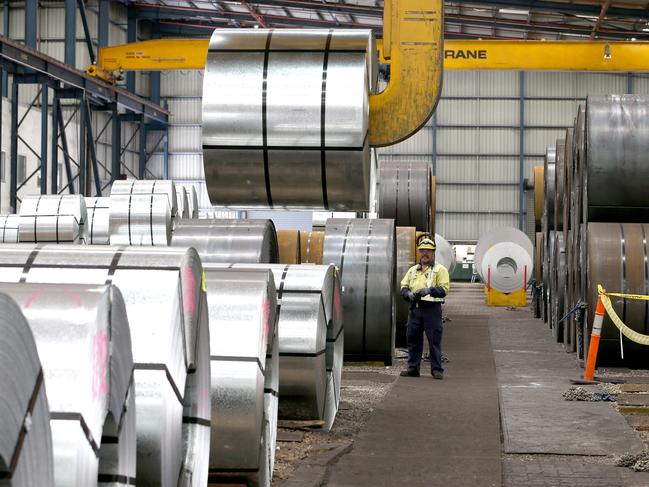
HOW DID THE ASX REACT?
Billions in value has been wiped from the Australian sharemarket following the shock announcement from US President Donald Trump he will impose sweeping 25 per cent steel and aluminium tariffs on “everybody”.
The benchmark ASX200 tumbled 0.5 per cent at the opening bell for an estimated $15bn loss in just the first hour of trading.
The US imported about $638m worth of Australian steel in 2024, the UN’s COMTRADE database shows, and major ASX-listed companies like Rio Tinto would be exposed to the duties.
Economist Stephen Innes said Asian markets were scrambling for their “trade war helmets” on Monday morning.
“Trump’s latest move isn’t merely another trade skirmish. It’s an escalation of his ‘America First’ trade doctrine where ‘no country is off limits’,” he said.
“This high-stakes gamble could disrupt global supply chains.”
Originally published as Donald Trump’s steel tariffs: What it means for Australia


